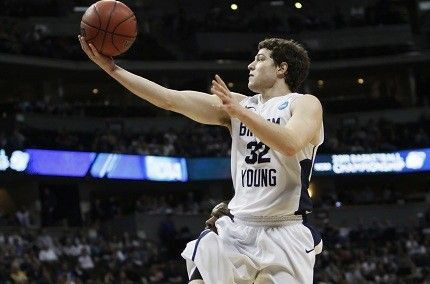Jimmer Fredette: Jazz to Draft the BYU Guard With the 12th Pick?

The NBA combines have been featured on the NBA TV and there is one player that has been gaining a lot of attention.
Brigham Young guard Jimmer Fredette has been the source of much speculation as to where he will be drafted, and if he can make the transition from the college to the NBA.
Fredette emerged as the most talked about guard in college basketball after basically carrying his team on his shoulders to the Sweet 16, and the 6'2 senior has a decent chance of becoming a lottery pick.
A major question mark dogging Fredette is what position he will play. There are also questions about his athleticism, and so far, Fredette appears to have the same physique from his BYU playing days.
His athleticism doesn't seem to be a huge problem, though, and it hasn't seemed to lower his stock.
By the nature of his game, he seems best suited for a shooting guard role, but he lacks the size for that position. That leaves him as a probable point guard, which would create defensive problems, and would call into question his ability to create as a playmaker.
But teams need shooters, and Fredette can certainly shoot. Also, like many amateur athletes making the jump to the NBA, Fredette is likely aware of his shortcomings, and is currently spending time to overcome them.
It's probably little secret that Fredette would like to play for the Utah Jazz, and general manager Kevin O'Connor likely has his eye on him.
Fredette even said that he grew up watching and following John Stockton and Deron Williams. If that isn't a clue to what team he favors, I don't know what is.
Utah has two lottery picks, (No. 3, and No. 12) and it seems that Fredette would be an ideal selection for the organization should they choose they keep the 12th pick and draft a player who made a name for himself in nearby Provo.
The Jazz have two small guards in Ronnie Price and Earl Watson that will test the free agent market this summer, as well as swing man C.J. Miles.
Teams usually draft on talent instead of need, so Utah won't necessarily target a guard with their two selections. Since the Jazz may lose free agent forward Andrei Kirilenko, O'Connor may want to compensate for Kirilenko's possible departure by drafting a scoring wing player.
What also doesn't help Fredette's chances of playing for Utah is the role of Devin Harris. With the departure of Deron Williams, Harris has stepped into the starting role, and is the same height as Fredette and is also a very good shooter. At 28, Harris has experience on his side, and owns more of an NBA-style game than Fredette. It might make little sense to use a pick on a player that shares similarities with a current starter.
What is interesting about Fredette's situation, in relation to the Jazz's two picks, is where he's expected to be chosen on June 23rd.
NBADraft.net currently has Fredette slotted to Utah with the 12th pick. At one point, the Web site had Fredette as the seventh pick in their mock draft.
DraftExpress.com has Fredette falling to the 15th pick, but that a raise from the 20th pick, where the Web Site had him a few weeks ago.
It's possible a team ahead of Utah in the draft, picking between the fourth pick and the 11th pick, would draft Fredette and try to work a trade with Utah for their 12th pick and additional compensation.
More than likely, the Jazz would make the deal. Fredette's presence at Energy Solutions Arena would be a major public relations boost, and the Jazz may very well need a guard who can consistently hit outside shots, even if it means Fredette coming off the bench and Harris remaining the starter.
It also wouldn't be surprising if O'Connor pulls off a draft-day trade to land Fredette and still hold the two lottery picks. The Jazz might be on the cusp of a major youth movement, so Fredette's presence could be a key player next season.
With the departure of Jerry Sloan and missing out on the playoffs, the Jazz have reason to make changes and going with young players is probably a smart approach. Fredette wearing a Jazz uniform next season is a distinct possibility should Utah not retain their free-agent guards, and need another outside shooter.
There's no denying that Fredette has talent. He averaged 28.9 points per game at BYU, and had some fantastic collegiate performances. He had four games where he scored 42 points or more. Fredette also shot 45.2 percent from the field -- great numbers for a perimeter player.
A major asset for Fredette going into the draft was his noticeable improvement over last season. He raised his scoring average from 21.6 points per games, and played more minutes. Fatigue didn't set in for the senior, and that's a big deal in the NBA where players are expected to last a grueling 82-game schedule.
Players are judged by their potential, and Fredette has plenty of that.
© Copyright IBTimes 2024. All rights reserved.






















